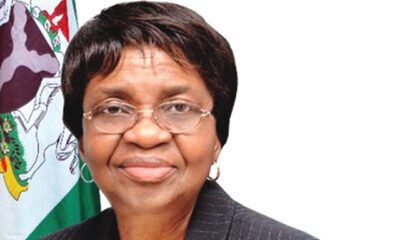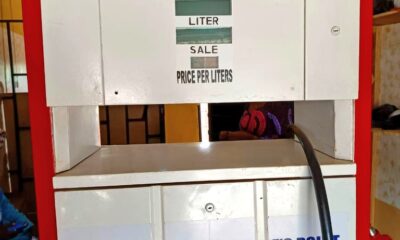Health
NAFDAC to enhance capability of Agulu, Kaduna laboratories
The National Agency for Food and Drug Administration and Control (NAFDAC) said on Monday that it would enhance the capability of the Agulu and Kaduna NAFDAC laboratories for the quality of medicinal products.
Director General of NAFDAC, Prof. Mojisola Adeyeye said this in Abuja on Monday at a news conference.
Adeyeye said that the laboratories would be used for risk-based approach for ascertaining the quality of medicinal products.
According to her, the mandate of the agency is to safe guard public health by ensuring that food and drug products made available to the public are safe and effective.
“We are proud to announce the significant strides we have made in enhancing the safety and quality of pharmaceutical products in Nigeria.
“This has been through the implementation of pharmaceutical traceability, pharmacovigilance, post marketing on the field, checking for substandard falsified medicines, and other system strengthening interventions,” she said.
Adeyeye said that the endeavour had been made possible through vital support from the Global Fund’s Resilient and Sustainable Systems for Health (GF-RSSH) grant, with the National Agency for the Control of AIDS (NACA) as the principal recipient.
According to her, the Global Fund is an international financing institution dedicated to combating HIV and AIDS, Tuberculosis, and Malaria.
She said that the fund provided support to countries in their efforts to address global health challenges and strengthen health systems.
“NACA is Nigeria’s main organisation for the control of HIV and AIDS and it is responsible for coordinating the country’s response to HIV and AIDS and provides strategic guidance for the national response.
“Part of their activities is strengthening NAFDAC’s role and capacity in pharmacovigilance and ADR monitoring and reporting,” she said.
Adeyeye said that several budget lines were being implemented by NAFDAC during Grant Cycle 6, under the GF-RSSH grant.
The NAFDAC boss said that the agency had successfully built the capacity of 76 staff members across the nation on Pharmacovigilance of AIDS, Tuberculosis, and Malaria (ATM) commodities.
She said that in addition, GF (BL 106) supported NAFDAC to acquire a mobile app for ADR reporting and monitoring Pharmacovigilance activity.
Adeyeye said that the implementation of a mobile app had streamlined the reporting and monitoring of adverse drug reactions ADR and improved the overall responsiveness of the healthcare system.
“To ensure that the medicinal product is the right medicine which the label carries, Global Fund (BL36) supported three NAFDAC state offices with three field devices (Truscan®) for rapid on the spot check for product quality.
“NAFDAC’s state offices have been further equipped with some devices for rapid screening of product quality, ensuring that unsafe and substandard products are swiftly identified and removed from circulation.
“In addition to this, we funded the Yaba Central Drug Control Laboratory (CDCL) to conduct comprehensive analysis of ATM and other disease programme medicines,” she said.
Health
Outbreak: Zamfara Govt. confirms 4 deaths, 177 cases


The Zamfara Commissioner for Health, Dr Aisha Anka has confirmed the outbreak of unknown illness in the state which recorded four deaths and 177 cases so far.
Anka confirmed this in a statement issued in Gusau on Friday by the Information Officer of the ministry, Malam Bello Ibrahim.
According to the commissioner, the disease is characterized by abdominal distension, accumulation of fluid in the abdomen, enlarge liver, enlarge spleen, fever and general body weakness.
“The illness is found in Maradun, Shinkafi and Gusau local government areas in the state.
“Children are mostly affected and the cases are associated with water consumptions.
“So far, four deaths have been recorded, 177 cases were detected,” Anka said.
“The incident has been reported to the National Centre for Disease Control (NCDC), partners and all other relevant stakeholders.
“The ministry of health is currently on the emergency response phase to identify the illnesses and causes.
“Various biological human and animal samples, soil samples, water samples, agricultural and foodstuff samples have been taken to Lagos and Abuja laboratories for analysis.
“The ministry will continue to update the general public and all relevant stakeholders and partners on any update about the outbreak,”she added. (
Health
Assembly passes Kano Pre-Marital Health Screening Bill


Kano State House of Assembly has passed a bill for a law to compel intending couples to undergo HIV, hepatitis and sickle cell anaemia screening before marriage.
The passage followed deliberations in the Committee of the Whole House during plenary session,
presided over by the Speaker, Ismail Falgore on Monday in Kano.
After deliberations, the lawmakers approved the 3rd reading of the bill, read by the Deputy Clerk, Alhaji Nasiru Magaji.
Shortly after passage of the bill, the Majority Leader of the house, Lawan Hussein (NNPP-Dala), stated that “any person
intending to marry shall first submit self for medical examinations.”
He said the bill was considered and passed after the 3rd reading, following various legislative processes.
The leader further said that the bill was passed because the state had been battling with different health issues, including
HIV because people go into marriages without medical screening.
He said that the bill, if signed into law, would save many lives and curb the spread of life-threatening diseases.
“The bill will safeguard the health of citizens by institutionalising pre-marital testing to check the spread of diseases
like hepatitis, HIV and sickle cell anaemia,” he added.
Health
WHO to begin vaccination against Human Papilloma Virus May 27 in Kogi


The World Health Organisation (WHO), says it plans to commence vaccination against Human Papilloma Virus (HPV) on May 27 in Kogi.
The state’s Team Lead of WHO, Dr Muktar Toyosi, said this when he led his team on an advocacy visit to the State Council of the Nigeria Union of Journalists (NUJ) on Wednesday in Lokoja.
Toyosi said that the vaccination was meant for girl child of between the age nine and 14.
He said the ongoing sensitisation was to keep the people informed, and educate them on the vaccination of their children to protect them against cervical cancer in future.
”Kogi falls within the second phase of the programme. We are soliciting for the cooperation of the media in educating the people of the state on the HPV vaccination.
“There need for girls child across the state to take the vaccination to safeguard their future.
“Although the vaccine was initially scarce and difficult to get, the good news now is that it has been made available by the government,” Toyosi said.
Also speaking, the State Technical Assistant for WHO, Dr Ahmed Attah, said that the HPV mostly affect women, adding that the vaccination remained a preventive measure against the disease.
Attah, a former state Chairman of the Nigeria Medical Association (NMA) and a former Chief Medical Director (CMD), Kogi Specialist Hospital (KSSH) Lokoja, urged parents and guardians to avail their children of the vaccination to justify government’s investment.
In his response, the Kogi NUJ Chairman, Mr Seidu Ademu, described the health sector as very critical, stressing that the vaccination was a right step in the right direction.
Ademu promised a robust partnership with WHO to enable the team to achieve its set goals.
He stressed the need to inform, educate and sensitise the general public on the need to embrace the vaccine by ensuring that girls within the age range were vaccinated.
-
Finance4 months ago
Court orders Sen. Victor Umeh to repay N136m bank debt to AMCON
-



 Abuja Update3 months ago
Abuja Update3 months agoUNDP, FG partnership needed to achieve inclusion, equity- Minister
-
Abuja Update2 months ago
Banks drive stock market performance with N147bn gain
-
capital market2 years ago
Rt.briscoe, FBNH, Others halts negative performance of stock market
-
Submission Guidelines4 months ago
CALL FOR SUBMISSIONS: POETRY COLUMN-NND
-



 Health1 month ago
Health1 month agoCapacity training will reduce migration of health workers- NPHCDA
-



 Business4 weeks ago
Business4 weeks agoTingo Group unveils Tingo Electric, Tingo Cola drink at Lagos launch
-
News5 months ago
Oil thieves sponsoring malicious media campaign against Navy – Spokesman














